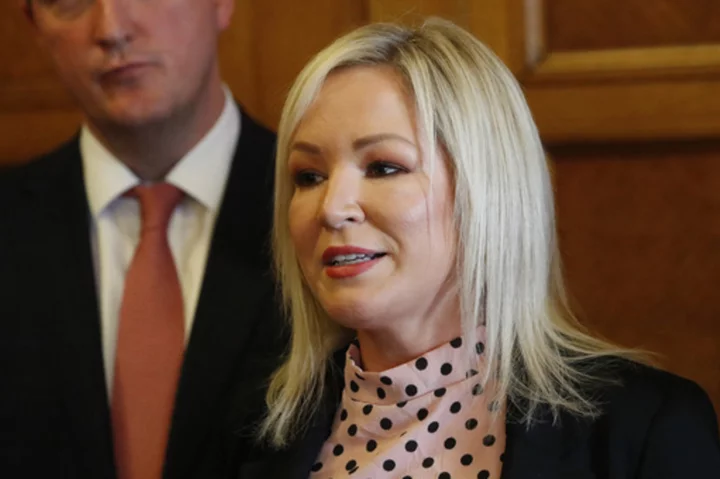LONDON (AP) — Irish nationalist party Sinn Fein made sweeping gains in Northern Ireland's local elections, repeating its success from last year's assembly elections, when it became the largest party for the first time.
With counting completed late Saturday, Sinn Fein, which seeks unification of Northern Ireland with the Republic of Ireland, took 144 of 462 local government seats — an increase of 39 from the last local government elections in 2019. Its main rival, the Democratic Unionist Party, captured 122 seats, while the centrist Alliance Party had 67.
Michelle O’Neill, Sinn Fein’s vice president, said the results were “momentous.” She added that her party's success was a message from voters that Northern Ireland’s power-sharing government, which has been paralyzed for over a year, must get back to business.
“This election was an opportunity to send a clear signal ... to support the positive leadership and a party that wants to get the Assembly up and running,” O’Neill said.
The semi-autonomous Belfast government has been suspended since the DUP, which wants to keep Northern Ireland part of the United Kingdom, walked out more than a year ago to protest a post-Brexit customs border between Northern Ireland and the rest of the U.K.
Under power-sharing rules established by the 1998 Good Friday peace accord, the main British unionist and Irish nationalist parties must govern together.
O'Neill said that the DUP's boycott of the assembly “cannot go on." She urged the British and Irish governments to work together and help resolve Northern Ireland's political stalemate.
“Public services are suffering, the public are suffering because of austerity,” she said. “It is not a tolerable situation, there shouldn’t be any more delays and I want to see a plan on the table as to how we are going to get back around the table to make politics work and to have a locally elected Assembly.”
Northern Irish politics have been stuck in a gridlock because of a prolonged dispute over the issue of customs checkpoints that were introduced when Britain left the trade bloc in 2020.
Northern Ireland is the only part of the U.K. that shares a border with an EU member — Ireland. That border is particularly sensitive because of the history of sectarian violence on the island of Ireland, and Britain and the EU agreed to keep the border free of customs posts and other checks to honor Northern Ireland's peace process. Instead, there were checks on some goods entering Northern Ireland from the rest of the U.K.
That angered the DUP, which maintained that the new trade arrangements undermine Northern Ireland’s place in the United Kingdom.
In February, the U.K. and the European Union agreed a deal to overcome the political crisis. The so-called Windsor Framework aims to ease customs checks and other hurdles for goods moving to Northern Ireland from the rest of the U.K.
The U.K. and the EU hailed their deal as a decisive breakthrough in their often fractious relationship. The agreement also gives Northern Ireland politicians a mechanism, known as the Stormont Brake, to challenge new EU trade rules that could apply — a key unionist demand.
But the DUP rejected the deal, and has continued to refuse to take part in the power-sharing government.
Sinn Fein captured the largest number of seats in Northern Ireland's assembly in May 2022 in a historic victory. It was the first time they beat the DUP, which had dominated the legislature for two decades.

